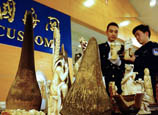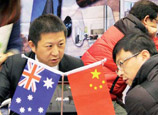
BEIJING, March 22 (Xinhua) -- China's central authority recently appointed new Communist Party of China (CPC) chiefs for seven provinces and autonomous regions, largely putting the country's leadership transitions at the central and local levels to an end.
One particularly noticeable change involves the leaders' educational backgrounds. Compared with previous generations of leaders, a notably larger portion of the new leaders hold degrees in liberal arts instead of engineering.
Observers believe the change will cater to the contemporary need to shift government functions from management to providing services.
New party chiefs have recently been appointed for the provinces of Hebei, Heilongjiang, Jiangxi, Henan, Hunan and Qinghai, as well as the Ningxia Hui Autonomous Region.
Last November, a new CPC leadership came to power at the CPC's 18th National Congress.
It was followed by a new generation of leadership that was unveiled for state organs and the country's top political advisory body at the recently concluded sessions of the national legislature and top political advisory body.
President Xi Jinping graduated from Tsinghua University with a doctorate degree in law, while Premier Li Keqiang earned a bachelor's degree in law and a doctorate degree in economics at Peking University .
In comparison, their predecessors were more likely to study engineering, hydraulics and geology.
Among the 33 members of the State Council, or China's cabinet, eight majored in science and engineering, 10 in politics and economics and the remaining 15 in humanities, such as literature, history and philosophy.
The educational backgrounds of local CPC and government heads also feature a similar trend.
For instance, Guo Gengmao, the new secretary of the CPC Henan Provincial Committee, studied in Peking University's Department of International Politics.
Lu Hao, who has been transferred from the post of first secretary of the Communist Youth League Central Committee to deputy CPC chief of Heilongjiang Province, earned a master's degree in economics at Peking University.
As China beefs up the construction of a service-oriented government, an increasing number of people schooled in law, history and philosophy will hold important local offices, said Wang Yukai, a professor at the Chinese Academy of Governance.
The trend, which has already prevailed in developed countries, is the result of a need to transform government functions and innovate social management, Wang said.
In the 205-seat 18th CPC Central Committee, which was elected at the CPC congress last November, only 21 members with a bachelor's degree or above were schooled in science and engineering, while the others majored in humanities, law or a combination of humanities and science.
Many of the newly-installed CPC and government leaders have academic backgrounds that will aid the country's socioeconomic development, said Professor Dai Yanjun from the Party School of the CPC Central Committee.
Officials with liberal arts education will be better able to tackle social issues that crop up in the course of China's economic progress, Dai noted.
More than three decades of reform and opening up have brought marked economic development, as well as new problems and conflicts.
In this sense, the country needs interdisciplinary professionals to better manage society, seek common prosperity, uphold social equity and justice and improve institutions, Dai said.
In academics, debates over whether engineering or liberal arts educations can create better leaders have existed for some time.
For Wu Jiang, president of the Chinese Academy of Personnel Science, neither is better or worse. He said it is only a matter of which background can best adapt to the country's current phase of development.
More humanities-trained professionals are replacing engineers as CPC and government heads, which is natural as China moves on to the post-industrial stage, he explained.
In the previous industrial stage, engineers and technicians were in great demand in all sectors of society, with some gradually transferred from engineering and technical posts to managerial and leadership posts.
However, in the post-industrial stage, society is in need of more economic, managerial and legal professionals, according to Wu.
More humanities-educated professionals are assuming leadership positions, which indicates that soft science is playing a bigger role in state and social administration, he said.
As early as 20 to 30 years ago, Chinese academics predicted a shift in officials' overall academic backgrounds from engineering to liberal arts.
The prediction has now come true, bringing China in line with internationally prevailing patterns, Wu said.
















 Now you can use mobile phone to 'call' the dead
Now you can use mobile phone to 'call' the dead


![]()
